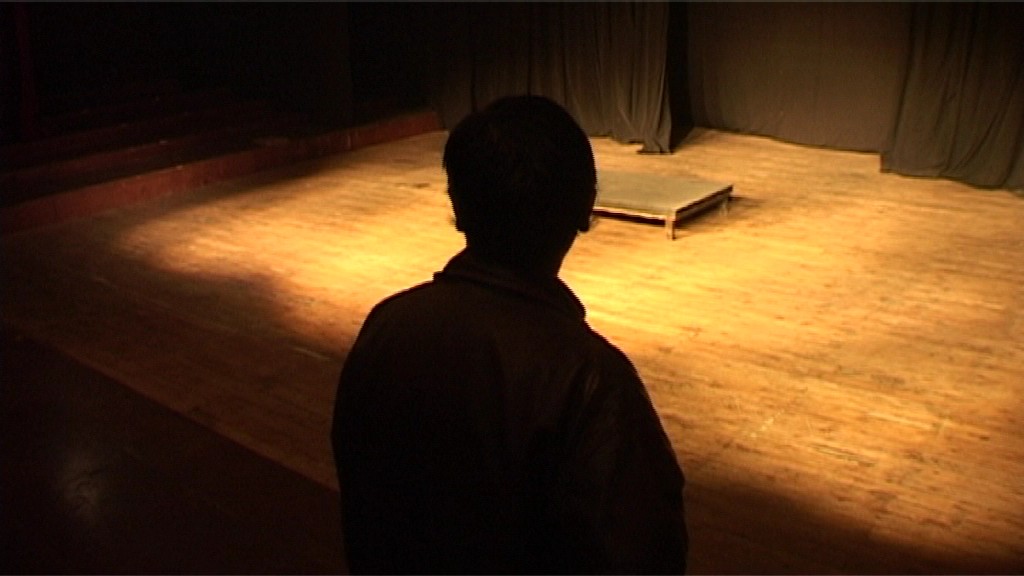At a very young age BV Karanth ran away from his house in Babukodi village near Mangalore in Karnataka, South India with a burning desire to learn music. Instead, he found himself joining the then famous ‘Gubbi Company’ a professional touring theater run by the legendary theater and film personality, Gubbi Veeranna. Although his quest for knowledge brought him to Banaras in Uttar Pradesh, North India, where he studied both Hindi and Music, he finally found his call in theater when he joined the National School of Drama in New Delhi under the tutelage of Ebrahim Alkazi. For years, BV Karanth traveled all over India influencing and training people in theater, staging plays and searching for a theatrical expression that based itself on Indian traditional forms and idioms. The film is a biography on the enigmatic, often controversial, ever nomadic and fearlessly independent theater director who in his own distinct way, reshaped the course of modern Indian theater in post independent India.
September 1st, 2002: We were rehearsing for the Kannada play Mahamayi at the Karnataka Sangh in Matunga, Mumbai. In the midst of rehearsals, the director of the play suddenly announced that BV Karnath was no more. I couldn’t believe it. I had always wanted to meet him and plead with him to give me a role in one of his plays; I didn’t mind even if a tiny one. His death meant that my dream would never be realized.
Or would it?
Later on, when I shifted to Bengaluru I finally got an opportunity to act in the re-runs of three of BV Karanth’s earlier plays; Not only that, I was blessed to be in the company of his wife, Prema Karanth, and Ninja, his favorite dog – the dog that seemed to ‘imitate’ the musical scales that Karanth used to practice rigorously! I further satiated my thirst to know more about BV Karanth and his life when I read his autobiography, Illiralaare, Allige Hogalaare (I Can’t Stay Here, But I Won’t Go There), complied by Kannada writer Vaidehi.
But now, after seeing BV Karanth – Baba, a documentary on him directed by Ramchandra PN, I realized that I was wrong in believing that I did know a few things about the man. I have no doubt in my mind that when others see the film, it would elicit the same feelings, even those who knew Karanth well enough.
Although it bases itself on BV Karanth’s autobiography Illialaare, Allige Hogallare, the film introduces and then unfolds Karanth’s life through a series of memories through the words of many of BV Karanth’s colleagues, friends, relatives and students. The film travels to the many places where BV Karanth himself had once travelled, and successfully reveals for the audience the impact of the legacy that he has left behind and that which continues even now. Hindi writer Kashinath Singh remembers Karanth as a man who took up the challenge of bringing to stage the most difficult works of one of the biggest playwrights in Hindi literature Jayashakar Prasad, something many theater directors in the Hindi speaking belt had shied away from. His collegemate, Kuwarji Agarwal, speaks on how in Banaras, when great actors lobbied to bag the all important role of Chanakya in a Historical play that he was doing then, Karanth, out of the blue, selected an utter novice for the role and trained him so well that the actor made the role his own. Neelam Mansingh speaks about how Karanth always thought out of the box by using conventional musical instruments in a radically different way to create music. Kirti Jain and Anuradha Kapur elaborate on how Karanth took to mentoring theater students at the National School of Drama (NSD) while Srinivas Kappanna explains how Karanth used and converted any space that was given to him into a theatrical space. BV Karanth’s association with cinema is covered through incisive bits from Girish Karand and Girish Kasaravalli. Vaidehi herself makes ocassional appearances in the film wherein she, in her soft voice, reads out a few lines from his autobiography. And then there are hordes of other theater activists – the young and the old, the well known and the unknown – from all over India whose lives Karabth touched…
The highlight of the film is that just as how Karanth freely used natural sounds to create music, just how he converted day to day household items into musical instruments blending them into a symphony with other regular musical instruments thus giving a new dimension to theatrical music, and just how he used local folk elements to interpret Shakespeare, so too director Ramchandra PN strives to be natural, using minimal lights and quite often entirely natural lights in this film while judiciously and creatively using the mesmerizing songs composed by Karanth himself within the film. And he is well supported with Sameer Mahajan’s highly evocative camerawork and Santosh Kumar’s perceptive sound design. As one views the film, it seems as though in front of our very eyes, a boy from a small village with dreams, desires and anxieties travels on the road not taken that he has chosen for himself and gradually becomes the theatrical giant that we all know he was.
The film is thus a most rewarding watch and also an extremely important one as it documents an important aspect of Indian Theatre – not just for those who knew Karanth or interacted with him but even for those not familiar with his work and most importantly, for all future generations to come.
Kannada, Documentary, B&W and Color


